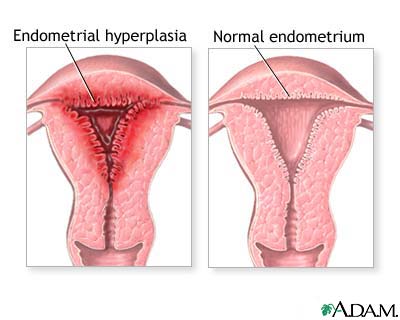Hyperplasia, Endometrial hyperplasia, cells and cancer

Hyperplasia - overgrowth of cells. Hyperplasia, also called hypertrophy, may occur for various reasons. Though the overgrowth of tissue may cause symptoms it is not necessarily cancerous. For example, BENIGN PROSTATIC HYPERPLASIA (BPH) is common in men over age 65 and commonly causes symptoms such as difficult URINATION. Endometrial hyperplasia is similarly common in women approaching MENOPAUSE, causing symptoms such as abnormal uterine bleeding. Typically the structure of cells and tissue in hyperplasia is normal; there is simply an overgrowth. The risk is that hyperplasia will progress to abnormal cells and tissue structure, a precancerous condition called DYSPLASIA. Unless it causes symptoms, hyperplasia does not require treatment other than diligent monitoring.
See also CANCER RISK FACTORS; CELL STRUCTURE AND FUNCTION.